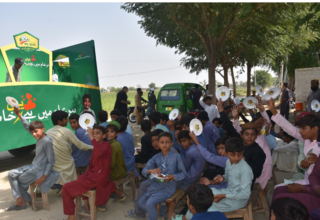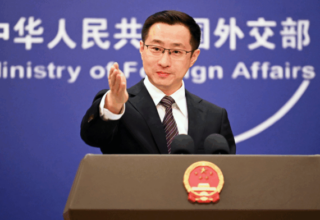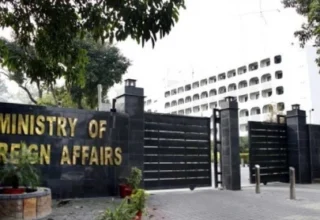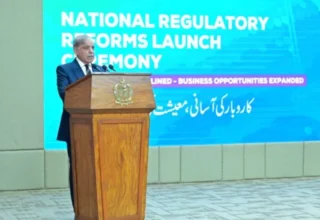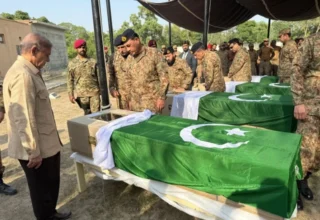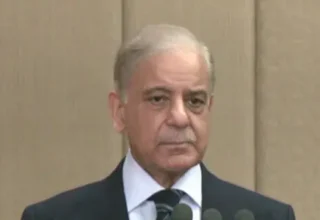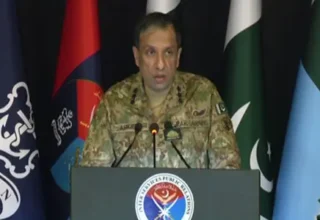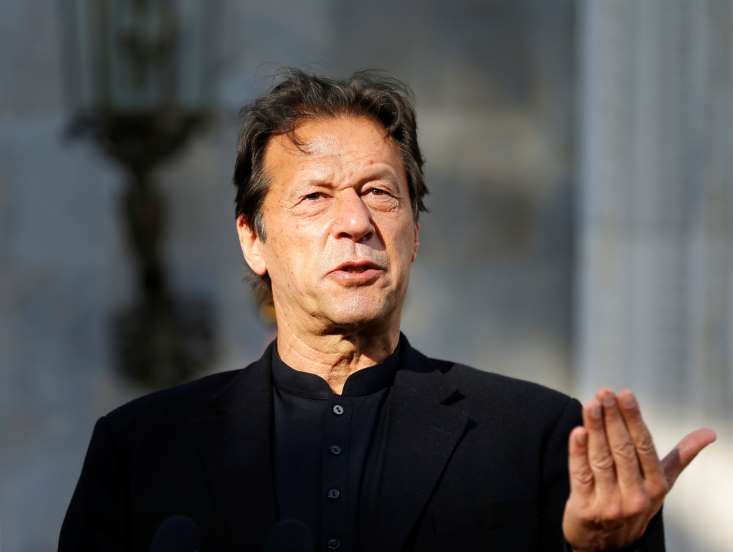
By Kazim Ali Gulzari
Since 2001, ties between Pakistan and Afghanistan have remained quivering and the misunderstandings caused troubles not only to a single country but to the region as a whole. Countries of the world, with much bigger problems, resolved their issues in the past and are now living next to each other with peace and prosperity.
In last two decades, both Pakistan and Afghanistan suffered irreparable loss because of terrorism and now is the time that the neighbors, despite having differences, must find a common interest at micro and macro levels.
The blame game in the past benefited others and brought all the worst in these countries. Both the countries are suffering from menace of terrorism, corruption, economic hurdles, distrust and interference by spoilers who never want them to come closer and resolve the issues being faced by them.
It is imperative that both the countries must learn from the past mistakes and work for the peace and tranquility in the region. Pakistan and Afghanistan should fight the conspiracies together for the better future of their people.
The founder of Pakistan, Mohammad Ali Jinnah, once said: “Our object should be peace within, and peace without. We want to live peacefully and maintain cordial friendly relations with our immediate neighbors and with the world at large.”
Recently, the security situation has deteriorated significantly in Afghanistan. Afghan government is unable to defeat terrorism alone. Most of the Afghans are of the view that it is a never-ending war and everybody must wait for their turn to be killed in cold blood. Every passing day innocent people are being killed indiscriminately.
Though, Taliban denied recent major attacks in Afghanistan on civilian but analysts believe that Taliban were the group involved in the attack to have upper hand in peace talks.
In last couple of years, thousands of security forces as well as civilian have been killed. It happens at a time when thousands of International security forces’ boots are still on the ground. Though the out-going US President, Donald Trump, has ordered further draw-down of US forces before he leaves office on January 20, 2021.
According to CNN report, the Pentagon has issued a notice to commanders known as a “warning order” to begin planning to draw-down the number of troops in Afghanistan to 2,500 troops by Jan 15, the officials said. Currently, there are approximately 4,500 US troops in Afghanistan. At this critical juncture, the role of Pakistan in helping to achieve peace and tranquility in Afghanistan is of immense importance.
Pakistan has played a significant role in bringing the Taliban to the negotiating table by involving all the stakeholders, and ensuring influx of billions of dollars in the health, education and infrastructure in Afghanistan and by providing trade route to Afghanistan via Gwadar Port.

Afghan government must not only expect from Pakistan to solve all the crises in Afghanistan, It should also play its role in solving the intrinsic issues, such as political instability and insecurity. In order to perpetually address the crisis, President Ghani must move forward with the consent of the major stakeholders in the country. It will be impossible for President Ghani to achieve the desired outcome without involving all the parties in the conflict. Analysts are of the view that this is the last opportunity that the government must avail for lasting stability and prosperity in Afghanistan.
On the other hand, Afghanistan can benefit from game changing mega projects in the region like China-Pakistan Economic Corridor (CPEC). Moreover, the Afghanistan-Pakistan Transit Trade Agreement (APTTA) would also boost Afghan economy.
The Pakistani Prime minister, Imran Khan, once said that the trade and commerce between Pakistan and Afghanistan, not only share economic interest but will also revive our ancient brotherhood. During ancient Kushan Gandara, Peshawar was its capital from 1st to 3rd century AD, the region as far as Afghanistan and China all traded under single currency.
Besides that Peshawar and Kabul were considered two sister cities from ancient periods to time immemorial, sharing culture, tradition, history, economy and brotherhood.
Imran Khan visited Kabul on Thursday, November 19, 2020. It was his first visit to Kabul since taking office in 2018. Mr. Khan’s delegation included the foreign minister and other senior officials.
The Pakistani foreign ministry before the visit said in a statement: “The Prime Minister’s program includes tete-e-tete with President Ashraf Ghani, delegation-level talks, and joint press stake-out. The focus would be on further deepening the fraternal bilateral relations between Pakistan and Afghanistan, the Afghan peace process, and regional economic development and connectivity.”
The statement further added: “The people of Pakistan and Afghanistan are linked through immutable bonds of history, faith, culture, kinship, values and traditions. The prime minister’s visit will help foster a stronger and multi-faceted relationship between the two brotherly countries.” Imran Khan’s first visit to Afghanistan would certainly help in economic prosperity, progress and development in the region.
Since the very inception, Pakistani prime minister was very blunt about Afghanistan’s policy and suggested that there is no military solution in Afghanistan. On many occasions, he stated: “Peace in Afghanistan is peace in Pakistan.”
While meeting with President Ashraf Ghani in June 2019, he distinctly indicated, “Whatever Afghans feel good for themselves, Pakistan will stand by their decision”. Undoubtedly, Imran Khan has been taking some bold decisions regarding his Afghan policy since assuming office such as pressurizing Taliban to join Intra-Afghan peace talks, fencing border to stop militant penetration etc.
It must be noted here that Pakistan had critical role in the US-Taliban peace agreement in February 2020. During his Kabul visit, addressing a joint press conference with president Ghani, the Pakistani prime minister said that Pakistan has played its role to indulge Taliban in Afghan peace talk, adding that despite the talks, violence has increased in Afghanistan.
“Pakistan is a country after Afghanistan that has more interest in peace in Afghanistan,” he added. Reiterating Pakistan’s support regarding peace in Afghanistan, he said: “We want peace for people of Afghanistan which are suffering since the past four decades.” President Ghani, on the occasion, called Khan’s visit to Kabul as “historic”, adding that, Pakistan’s Prime Minister has come with a message that “violence is not the answer to the current situation”.
“The demand of Afghan people is a comprehensive ceasefire,” Ghani said. As the Pakistani prime minister once said that lets not shadow of past darken the door step of futures, President Ghani should seize the opportunity to enhance gracious relation with Pakistan to uphold the maximum benefit from mega regional projects, China-Pakistan Economic Corridor (CPEC), by waving the friendship hand with Pakistan for the long-term Afghan economic interest.
Afghanistan has shown a deep willingness to participate in CPEC since 2016 even via official channels. Afghanistan would get benefit from a development project like CPEC. On the other hand, if Afghanistan is officially invited to CPEC, China and Pakistan stand to benefit immensely.
Pakistan will also benefit from better connectivity from Afghanistan to Central Asia. Afghanistan anxiously wants to improve its infrastructure and boost its economy by gaining access to Chinese investors.
Therefore, the inclusion of Afghanistan in the CPEC would be game changer for Afghanistan. Moreover, Afghan transit trade via Gwadar has already started on January 2020, under the APTTA. By this agreement, Afghanistan can import and export goods via Pakistani land routes.
APTTA is a bilateral trade agreement signed in 2010 by Pakistan and Afghanistan that calls for greater facilitation in the movement of goods between the two countries.
In a brief conclusion, Afghans want to get rid of the current mishaps by all imaginable means. Peace in Afghanistan means peace in the region. Both Pakistan and Afghanistan should focus on ground realities by adopting practical approaches, otherwise the entire region in general and both the countries in particular would be distracted from real path which leads to a long-lasting peace, prosperity and tranquility in the region.

Kazim Ali Gulzari is the former Vice-Chairman of the Daily Outlook Afghanistan. He can be reached at kazimaligulzari@yahoo.com

